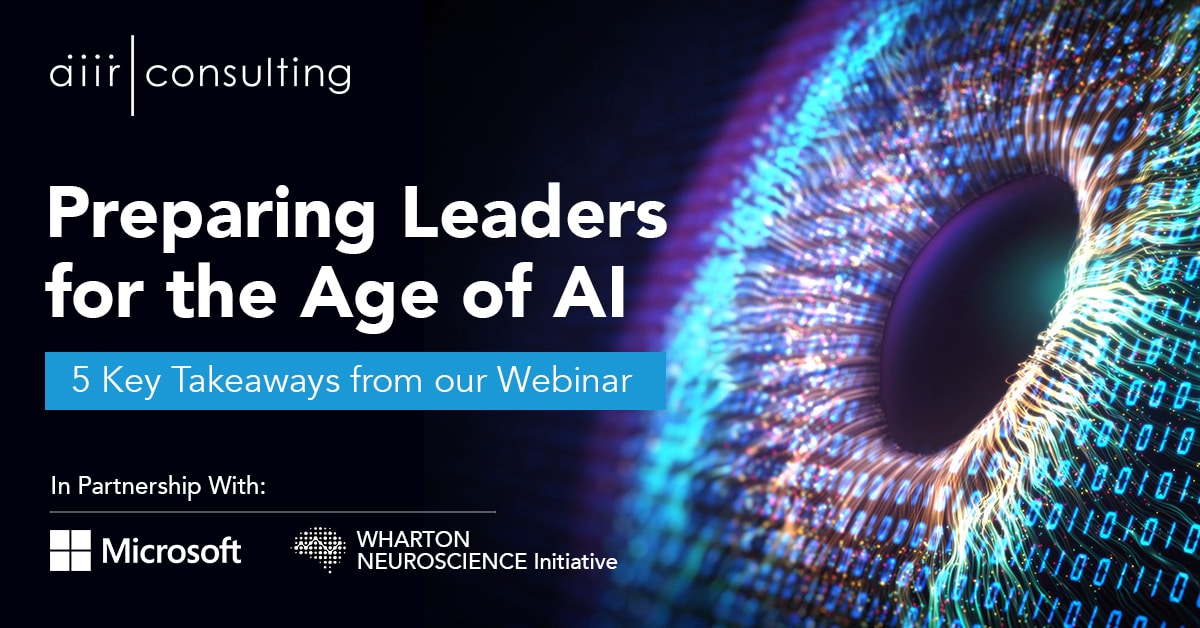
Will AI Make Leaders Obsolete? 5 Actionable Takeaways to Prepare Your Leaders to Succeed in an Age of AI
June 7, 2024
The past decade has seen an unprecedented acceleration of technology, characterized by enhanced computing power, increased network speeds, and advanced analytical capabilities. But nothing has generated more excitement (or engendered more apprehension) than the rapid advancements in generative AI we have experienced in the past year.
McKinsey recently released a report detailing the impact of 60+ business use cases for generative AI that could deliver annual economic benefits ranging from $2.6 trillion to $4.4 trillion across industries. But, while AI has the potential to drive growth and address complex global challenges, it also has the potential to create real pain.
While previous advances in artificial intelligence affected physical work, recent advances have the potential to replace knowledge workers in fields including medicine, education, law, and the arts. In fact, studies estimate that AI will replace 45 million workers by 2030.
How Can HR Prepare Their Leaders to Work With AI?
What are the skills leaders will need to thrive in a future where they work alongside AI? And, what can HR and Talent Leaders do now to prepare their leaders and organizations for what’s coming tomorrow?
To answer this question, AIIR Consulting recently hosted a panel discussion entitled “Will AI Make Leaders Obsolete?” featuring Dr. Michael Jabbour, Chief Innovation Officer at Microsoft Education, and Dr. Michael Platt, Director of the Wharton Neuroscience Initiative. Guided by AIIR’s Chief Customer Officer, Megan Marshall, these experts explored the evolving role of leadership in the age of AI.
Here are five actionable takeaways from the discussion.
5 Actionable Takeaways to Prepare Your Leaders to Succeed in an Age of AI
1. Embrace Human-Centric Leadership
AI cannot replicate empathy, emotional intelligence, and interpersonal skills.
“While AI can process data and recognize patterns, it lacks the emotional depth and understanding that human leaders bring to the table,” said Dr. Platt.
Leaders must emphasize these human-centric qualities to connect with their teams and stakeholders. Dr. Jabbour added, “Empathy and emotional intelligence are the cornerstones of effective leadership, especially in a technologically advanced world where human connection can sometimes be overshadowed by digital interactions.”
Actionable Steps: Invest in training programs that enhance emotional intelligence, active listening, and empathy. Encourage leaders to prioritize human connections and understand the unique needs of their team members.
2. Commit to Continuous Learning and Adaptability
The rapid evolution of AI requires leaders to continually update their skills and adapt to new technologies. Lifelong learning is essential to stay relevant. Dr. Jabbour emphasized, “In an era where AI is constantly advancing, leaders must commit to lifelong learning to remain effective and innovative.”
Dr. Platt concurred.
“Adaptability and a willingness to learn are crucial for leaders to navigate the ever-changing landscape of AI technology,” he said.
Actionable Steps: Create a culture of continuous learning within the organization. Provide access to resources such as online courses, workshops, and seminars on the latest AI advancements and their applications in leadership.
3. Leverage Collaboration Between Humans and AI
AI and human leaders have complementary roles. “Collaboration between AI and human leaders can lead to unprecedented levels of efficiency and creativity,” said Dr. Jabbour.
But, while AI can handle data analysis and routine tasks, human leaders are essential for strategic thinking and creative problem-solving. As Dr. Platt noted, “AI is an invaluable tool for handling complex data, but it is the human leaders who can synthesize this information into strategic actions and innovative solutions.”
Actionable Steps: Encourage leaders to delegate routine tasks to AI tools, allowing them to focus on strategic and creative initiatives. Foster a collaborative environment where AI is seen as a partner rather than a threat.
4. Prioritize Ethical Leadership
The deployment of AI must be guided by strong ethical principles. Leaders need to ensure that AI is used responsibly and that ethical considerations are integrated into decision-making processes. Dr. Jabbour stressed, “Ethical considerations are paramount when deploying AI technologies. Leaders must ensure that AI is used in a way that is fair, transparent, and respects privacy.” Dr. Platt echoed this sentiment, stating, “Ethical leadership is not just about compliance, but about setting a standard for responsible AI use.”
Actionable Steps: Develop and enforce ethical guidelines for AI usage within the organization. Train leaders on the ethical implications of AI and encourage transparency in AI-driven decisions.
5. Embrace Data-Driven Decision Making
AI provides powerful tools for data analysis that can inform strategic decisions. Leaders must be adept at interpreting data and using it to guide their actions.
Dr. Platt explained, “Data-driven decision-making allows leaders to make informed choices that are backed by empirical evidence rather than intuition alone.”
Dr. Jabbour added, “The ability to analyze and interpret data is becoming an essential skill for leaders in the AI era.” Dr. Jabbour also emphasized that a key skill for leaders will be interpreting outputs from AI, including detecting hallucinations from AI.
Actionable Steps: Equip leaders with the skills to analyze and interpret data effectively. Implement AI-powered data analytics tools that provide actionable insights and support informed decision-making.
The Bottom Line
The future of leadership in an age of AI lies in the harmonious integration of human qualities and AI capabilities. By embracing human-centric leadership, committing to continuous learning, leveraging AI collaboration, prioritizing ethical considerations, and adopting data-driven decision-making, leaders can navigate the challenges and opportunities presented by AI.
Are You Ready To Shape A Better Future Together?
Partner with AIIR to empower your leaders and ascend into the future.